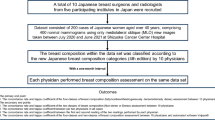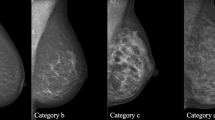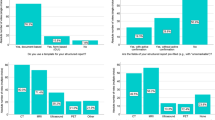Abstract
Purpose To address the widespread concern that false-positive results during breast MRI screening may have adverse psychological effects. Methods Impact of Event Scale measurements in 103 high-risk women enrolled in a longitudinal MRI screening study and comparison of subjects with normal results vs. those with prior recall events. Results Of 189 MRI scans performed, 64 (34%) prompted further evaluation. Subjects with previously abnormal results had significantly higher Avoidance scores at the time of their second MRI. Multivariate analysis showed this was driven by the greater number of BRCA1/2 carriers in that group but was not related to screening recall. Conclusions Practitioners’ concerns about the high false positive rate of breast MRI may not be matched by actual psychological effects in most high-risk women.
Similar content being viewed by others
References
Saslow D, Boetes C, Burke W et al (2007) American Cancer Society guidelines for breast screening with MRI as an adjunct to mammography. CA Cancer J Clin 57:75–89
Kriege M, Brekelmans CT, Boetes C et al (2004) Efficacy of MRI and mammography for breast-cancer screening in women with a familial or genetic predisposition. N Engl J Med 351:427–437. doi:10.1056/NEJMoa031759
Kuhl CK, Schrading S, Leutner CC et al (2005) Mammography, breast ultrasound, and magnetic resonance imaging for surveillance of women at high familial risk for breast cancer. J Clin Oncol 23:8469–8476. doi:10.1200/JCO.2004.00.4960
Leach MO, Boggis CR, Dixon AK et al (2005) Screening with magnetic resonance imaging and mammography of a UK population at high familial risk of breast cancer: a prospective multicentre cohort study (MARIBS). Lancet 365:1769–1778. doi:10.1016/S0140-6736(05)66646-9
Lehman CD, Blume JD, Weatherall P et al (2005) Screening women at high risk for breast cancer with mammography and magnetic resonance imaging. Cancer 103:1898–1905. doi:10.1002/cncr.20971
Warner E, Plewes DB, Hill KA et al (2004) Surveillance of BRCA1 and BRCA2 mutation carriers with magnetic resonance imaging, ultrasound, mammography, and clinical breast examination. JAMA 292:1317–1325. doi:10.1001/jama.292.11.1317
Brett J, Bankhead C, Henderson B et al (2005) The psychological impact of mammographic screening. A systematic review. Psychooncology 14:917–938. doi:10.1002/pon.904
Rimer BK, Bluman LG (1997) The psychosocial consequences of mammography. J Natl Cancer Inst Monogr (22):131–138. Review. 27 refs
Steggles S, Lightfoot N, Sellick SM (1998) Psychological distress associated with organized breast cancer screening. Cancer Prev Control 2:213–220
Elmore JG, Wells CK, Howard DH et al (1997) The impact of clinical history on mammographic interpretations. JAMA 277:49–52. doi:10.1001/jama.277.1.49
Lerman C, Kash K, Stefanek M (1994) Younger women at increased risk for breast cancer: perceived risk, psychological well-being, and surveillance behavior. J Natl Cancer Inst Monogr (16):171–176
Schwartz MD, Taylor KL, Willard KS (2003) Prospective association between distress and mammography utilization among women with a family history of breast cancer. J Behav Med 26:105–117. doi:10.1023/A:1023078521319
Horowitz M, Wilner N, Alvarez W (1979) Impact of event scale. Psychosom Med 41:209–218
Sundin EC, Horowitz MJ (2002) Impact of Event Scale: psychometric properties. Br J Psychiatry 180:205–209. doi:10.1192/bjp.180.3.205
Thewes B, Meiser B, Hickie IB (2001) Psychometric properties of the impact of Event Scale amongst women at increased risk for hereditary breast cancer. Psychooncology 10:459–468. doi:10.1002/pon.533
Corneil W, Beaton R, Murphy S et al (1999) Exposure to traumatic incidents and prevalence of posttraumatic stress symptomatology in urban firefighters in two countries. J Occup Health Psychol 4:131–141. doi:10.1037/1076-8998.4.2.131
Rausch DR, Hendrick RE (2006) How to optimize clinical breast MR imaging practices and techniques on your 1.5-T system. Radiographics 26:1469–1484. doi:10.1148/rg.265055176
Liberman L, Menell JH (2002) Breast imaging reporting and data system (BI-RADS). Radiol Clin North Am 40:409–430. doi:10.1016/S0033-8389(01)00017-3
Brett J, Austoker J (2001) Women who are recalled for further investigation for breast screening: psychological consequences 3 years after recall and factors affecting re-attendance. J Public Health Med 23:292–300. doi:10.1093/pubmed/23.4.292
van Dooren S, Seynaeve C, Rijnsburger AJ (2005) Exploring the course of psychological distress around two successive control visits in women at hereditary risk of breast cancer. Eur J Cancer 41:1416–1425. doi:10.1016/j.ejca.2005.03.020
Lindberg NM, Wellisch D (2001) Anxiety and compliance among women at high risk for breast cancer. Ann Behav Med 23:298–303. doi:10.1207/S15324796ABM2304_9
Lindberg NM, Wellisch DK (2004) Identification of traumatic stress reactions in women at increased risk for breast cancer. Psychosomatics 45:7–16. doi:10.1176/appi.psy.45.1.7
Miller SM (1995) Monitoring versus blunting styles of coping with cancer influence the information patients want and need about their disease Implications for cancer screening and management. Cancer 76:167–177. doi :10.1002/1097-0142(19950715)76:2<167::AID-CNCR2820760203>3.0.CO;2-K
Gilbert FJ, Cordiner CM, Affleck IR et al (1998) Breast screening: the psychological sequelae of false-positive recall in women with and without a family history of breast cancer. Eur J Cancer 34:2010–2014. doi:10.1016/S0959-8049(98)00294-9
Essink-Bot ML, Rijnsburger AJ, van Dooren S et al (2006) Women’s acceptance of MRI in breast cancer surveillance because of a familial or genetic predisposition. Breast 15:673–676. doi:10.1016/j.breast.2006.02.001
Castells X, Molins E, Macia F (2006) Cumulative false positive recall rate and association with participant related factors in a population based breast cancer screening programme. J Epidemiol Community Health 60:316–321. doi:10.1136/jech.2005.042119
Elmore JG, Barton MB, Moceri VM et al (1998) Ten-year risk of false positive screening mammograms and clinical breast examinations. N Engl J Med 338:1089–1096. doi:10.1056/NEJM199804163381601
Rosenberg RD, Yankaskas BC, Abraham LA et al (2006) Performance benchmarks for screening mammography. Radiology 241:55–66. doi:10.1148/radiol.2411051504
Kerlikowske K, Smith-Bindman R, Abraham LA et al (2005) Breast cancer yield for screening mammographic examinations with recommendation for short-interval follow-up. Radiology 234:684–692. doi:10.1148/radiol.2343031976
Kuhl CK, Schmutzler RK, Leutner CC et al (2000) Breast MR imaging screening in 192 women proved or suspected to be carriers of a breast cancer susceptibility gene: preliminary results. Radiology 215:267–279
Warner E, Causer PA (2005) MRI surveillance for hereditary breast-cancer risk. Lancet 365:1747–1749. doi:10.1016/S0140-6736(05)66520-8
Lindfors KK, O’Connor J, Acredolo CR et al (1998) Short-interval follow-up mammography versus immediate core biopsy of benign breast lesions: assessment of patient stress. AJR Am J Roentgenol 171:55–58
Acknowledgements
Funding for this study was provided by the Evanston Northwestern Healthcare Auxiliary Breast Ovarian Research Program. We also thank Sholanda King for assistance with scheduling and administrative help, Jennifer Beaumont for statistical support and Nan Rothrock for critical review of the manuscript.
Author information
Authors and Affiliations
Corresponding author
Rights and permissions
About this article
Cite this article
O’Neill, S.M., Rubinstein, W.S., Sener, S.F. et al. Psychological impact of recall in high-risk breast MRI screening. Breast Cancer Res Treat 115, 365–371 (2009). https://doi.org/10.1007/s10549-008-0140-0
Received:
Accepted:
Published:
Issue Date:
DOI: https://doi.org/10.1007/s10549-008-0140-0




